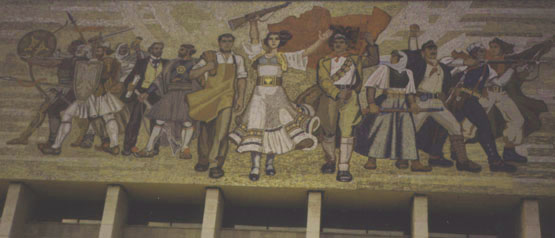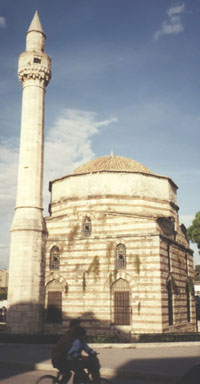|
Pages from the Journal: Serbia, Macedonia, Albania Saturday October 22, 1994 On the bus, Macedonia The good news first: it’s only 3 hours to Ohrid, half the distance to Tirana. It’s not raining, it’s not cold, and the bus is nearly empty. The bad news is that I’m on the verge of diarrhea. It’s not liquid diarrhea yet, and maybe I’ll spare the reader a more vivid account of my solid waste excretions, but it’s a cause of concern. A long bus ride and diarrhea are the worst possible combination as it is, but my doctor in Hungary told me to be very careful; it could be a symptom of worse things. I’m worried. I wish I had a Walkman. We’re a couple of hours underway. We’ve stopped for some woman on the road who’s gone off to wake up someone who’s also going to Albania. That was the explanation from a girl next to me. I feel like I’m in Asia or Africa again. My bowels are doing OK. We’ll see how long I can go without food or drink. I hope I survive this trip. I’m surprised this bus driver has the patience to wait. There must be more to this. He’s a typical third world bus driver, commandeering the road, horning everyone away. While we wait I am in the midst of a conversation about how lawless and horrible Albania is. The driver said that yesterday’s bus driver to Albania got robbed. Everyone is cautioning me. I hear the word “mafia” mentioned a lot. Have I mentioned that there was a cholera outbreak in Albania not long ago? I’ve heard a couple of second hand Peace Corps stories about Albania. One is that a guy there has started a collage entitled: “Things I Have Found in My Bread”. So far it includes a coin, a nail, rocks, and other such flavoring necessities. Every facet of this trip so far has been full of misinformation. I can’t trust anything anyone says about the buses. I bear in mind that all my information comes from Macedonians, not on the best terms with Albanians. I’m getting excited about this, the anticipation of something big, like going into Cambodia by bus from Vietnam. I sense that it’s a little adventurous for the bus driver and his man Friday, too. This is the kind of trip where I wish I was traveling with someone. I wouldn’t be just sharing my misery. The interaction would feed on it and eat it away. Hungary feels eons away in time and place. I haven’t showered since Pecs. I drank the tap water in Belgrade and Skopje. Was that a mistake? Trippy scene here at the Macedonian border. There’s a girl with a white lab coat next to a shallow pink tub with some sort of liquid in it. The incoming cars from Albania are stopped after they’ve driven through a wet recessed area that coats the tires. Everyone gets out and goes to the girl whereupon they dip the soles of their shoes in the tub, get handed some tablets and then move on to customs. Now on the Albanian side of the border, in some form of tit for tat, an Albanian is now spraying the bus wheels with something. Poor sap, it’s raining and he has this heavy, awkward contraption on his back like a leaf blower to deal with. While we are sitting here, the driver has fiddled with the radio and got “Hotel California” on clearly. Two young Albanians we just picked up are humming along. There’s an Albanian family here, too, with a girl too old to have a teddy bear protecting it. Now a man in shabby clothes is bear-hugging the guard. Maybe the delay now is that my bus driver has not bear-hugged the guard. No one dresses in light colors in the Balkans. Saturday October 22, 1994 Tirana, Albania ALBANIA!!! That damn bus really took 11 hours to get here from Skopje, but as soon as I saw Skanderbeg Square in the middle of Tirana, I’d forgotten all about it. I’m very excited by what I see. The two guys humming “Hotel California” insisted on buying me a 7up at a rest stop on the way here. Real nice guys. Our common language was Italian—though I don’t speak Italian. The most striking thing about the Albanian countryside is the multitude of pillbox shaped bunkers. The old dictator, Enver Hoxha, was paranoid about enemy attack, so he built these little concrete bunkers about 3 feet tall. They’re not just at strategic points but all over. Close to the border they’re nearly every 100 meters, and if that means in a park, next to the street, in the middle of a field, so be it. The overwhelming first impression of Albania is rawness. It feels like a mix between Nepal and Central Turkey, Nepal for its mountains, beauty, and mongrel-like village kids, and Turkey for its vague Muslim flavor. Maybe I’m getting carried away already and should wait to talk about it until the end. The bus finally came to a stop in Skanderbeg Square, a huge, huge square that I’d read was strangely quiet and sedate because of a lack of cars. No more. Hundreds of people buzz about on foot, motorbikes, and in lots of cars. The sheer energy is something I’ve never seen in Europe. The square is so big its lanes and throughways are not definable, so cars and people and bikes fight for passage, might and speed prevailing. 
The two dudes that befriended me took it upon themselves to find me a phone, no small task. They led me back through the square, cars and bikes swerving all around us. I remembered one Peace Corp’s story of how cars being in their infancy here, anyone with a car in Albania automatically gets a license. Another Peace Corps guy told me there are two deaths a day here. We scurried across and went to the American Express office (!) where I was able to call Silvana Lalo’s place and arranged to be met across the street at a fast food place called Hambo’s. As I waited, I noticed some women wore skirts above the knee and no men that I saw paid much notice to it. (In Skopje at a traffic light I walked across the street with a girl who—let’s just say it—was no great shakes (Copyright Bruce Abrams) and the Macedonians went bananas, honking horns, rolling down windows to catcall her. I saw several embarrassing scenes like that, but that’s a subject for another time.) I saw reasonably well-dressed men in ties conversing as they pushed old bicycles on the sidewalk. I heard people speaking a less harsh language than in the old Yugoslavia. The phrase that epitomizes Serbian for me is “Jugoslavske Zeleznice”, Yugoslavian Railways, full of zh and z and sk and ts. Here there appears to be a slight lilt. 
Silvana came. She is a friend of a friend of a friend of an acquaintance, and yet she is taking me in her home, giving me the living room to sleep in while shuffling everyone around, and feeding me a very delicious dinner of chicken and rice and great homemade yogurt. Tomorrow we go on an excursion to the countryside. Everyone except Grandpa speaks English. I couldn’t have dreamed up a better reception. I even had a shower! Silvana is the Managing Director for the Soros-supported Open Society Foundation for Albania. She speaks English very, very well. She’s only 27 and already a big cheese herself. She said the cholera thing has passed by now and that the few cases were only in provincial towns. I could tell she expected a lot of Western tainted, ignorant questions from me, and I appeared to be obliging. I had no idea about the food situation so I brought Hungarian salami and a box of orange juice as gifts, Perhaps I awkwardly presented them because they came off as gifts of pity or something. My ignorance about Albania (and the irony is that I know more than most!) is from the stranger-than-fiction stories one reads in the West. Take the story about the Albanian national soccer team in London for the first time for a World Cup qualifying soccer match. At departure time in Heathrow they see a duty free shop, recognize the word, “free” and simply go in and walk out with as much as they can carry. Or when the former Secretary of State, James Baker, came to Tirana. He was the highest-ranking U.S. official ever to come to Albania and the people swarmed his car, just wanting to touch it, that Hope was here. It was reported that people kissed the road after the car had driven over it and Baker, a well-traveled man, said that it was the strangest thing he’s ever seen.
|
